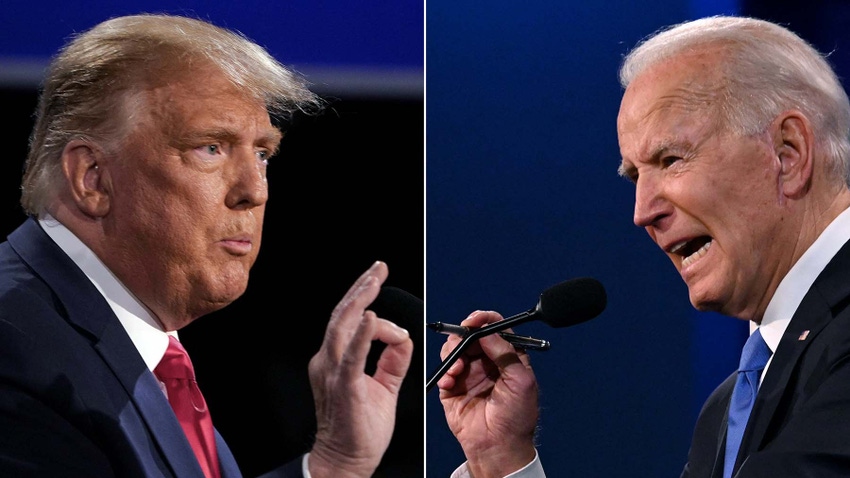
Support for former President Donald Trump remains strong according to a new Farm Futures reader survey. While the margins may be higher than national averages, they reinforce the narrative that rural America overwhelming wants four more years after a four-year break.
In January, 62% of readers said they intended to vote for Trump. Three months later, 87% of respondents say their opinions have not changed.
The numbers do not bode well for President Biden, who was only endorsed by 11% of respondents. Still, it’s not all good news for Trump. While 97% of readers say they will definitely vote in the election, approximately a quarter of them say they are considering third-party or write-in candidates.
Gary Larson is one of many survey respondents who would prefer a different candidate on the ballot. He’s a Wisconsin farmer who says he’s usually “fairly conservative.”
“I don’t really like any of the candidates, but I do know that the one in the White House now is bad,” Larson says. “If he isn’t bad enough, the vice president is worse.”
When it comes to his voting decision, Larson wants someone who will reduce the national debt and end the Russia-Ukraine war. He blames Biden for the ongoing war, which he believes a different administration would have stopped. He also wants to see federal funds for electric vehicles repurposed to fund a border wall.
Larson’s views are similar to many respondents, who cited immigration reform as one of their top three priorities. More than 60% of those polled said agricultural policies were their top concern. That was followed by 47% who cited tax policy and 28% who said immigration.
Notably, 87% of respondents say they would prefer increased exports to China versus more tariffs on their goods. During his term in office, Trump invoked higher tariffs, resulting in a trade war. USDA estimates that cost U.S. agriculture producers more than $27 billion between 2018 and 2019.
Northwest Louisiana soybean farmer William Sample Jr. acknowledges another trade war will hurt his bottom line. Still, he fully intends to vote for Trump because he thinks the former president can fix the economy.
“I figured the economy was running pretty good when Trump was in office, and Biden broke it, so I’ll vote for Trump,” Sample says.
As for China, he says tariffs should have been imposed as far back as the Reagan administration. Since then, he believes politicians have “kicked the can down the road.” Now he says somebody has to “pay the piper.” He’s willing to endure another trade war, even if it leads to retaliatory tariffs on grains and higher prices on things like steel, iron and chemicals.
“Something has to be done with China – they can’t just be allowed to rule the world,” Sample says. “It’s farmers that get stuck with that burden more than anyone else because it’s easier for China to do, but in the end, it’s something I think the U.S. needs to do.”
So who will decide the election?
Signs point to another close race. Trump currently holds a slight lead in most national polls, though Biden made up ground in March.
Polls also show more than half of all likely voters disapprove of both candidates. Once again, the election will almost certainly hinge on the same key battleground states that decided the 2020 contest. Those states include Pennsylvania, Wisconsin, Michigan, Nevada, Minnesota, Arizona, Georgia and North Carolina. Trump currently holds a small lead in all of them except Minnesota.
J. Miles Coleman from the University of Virginia Center for Politics notes in 2016, Trump was able to break through the so-called “blue wall” in several Midwestern states. These are states where Democrats previously held an advantage. While Biden won many of those back in 2020, Coleman says he didn’t rebuild that wall as much as patch it back up.
In 2012 President Obama won states like Michigan, Pennsylvania and Wisconsin by only a few percentage points. This was due in large part because he was competitive with rural white voters. Many of those voters flipped to Trump in 2016. While growing suburban areas in these states will play a key role, it’s the margins in rural areas that may make the difference in a hotly contested race.
“In 2012, there were a lot of counties in northern Wisconsin that were 55-45 for Romney,” Colemen says. “By 2016 and 2020 they were more like 65-35 Trump, so I think for Democrats, they need to keep those margins down.”
Coleman notes it’s hard for either candidate to make inroads because voters are so familiar with them. That, and their advanced ages make this matchup nearly unprecedented.
He predicts the elections will probably come down to turnout. A record number of voters went to the polls in 2020. At the time, Trump had significantly higher unfavorable ratings than Biden. Many voters were more anti-Trump than they were pro-Biden.
Now polls show Biden is viewed equally, if not more unfavorably than Trump. That may make fewer people motivated to vote. It may also steer more voters toward a third-party candidate. While no third candidate has a realistic shot at winning, they could steal just enough voters from major party candidates to impact the Electoral College outcome.
“This year is going to be more of a base election because most voters have firm opinions,” Coleman says. “It’s going to come down to who turns out their side. If the Democrats can make in-roads into Trump’s support in rural areas, that could go a long way.”
About the Author(s)
You May Also Like






